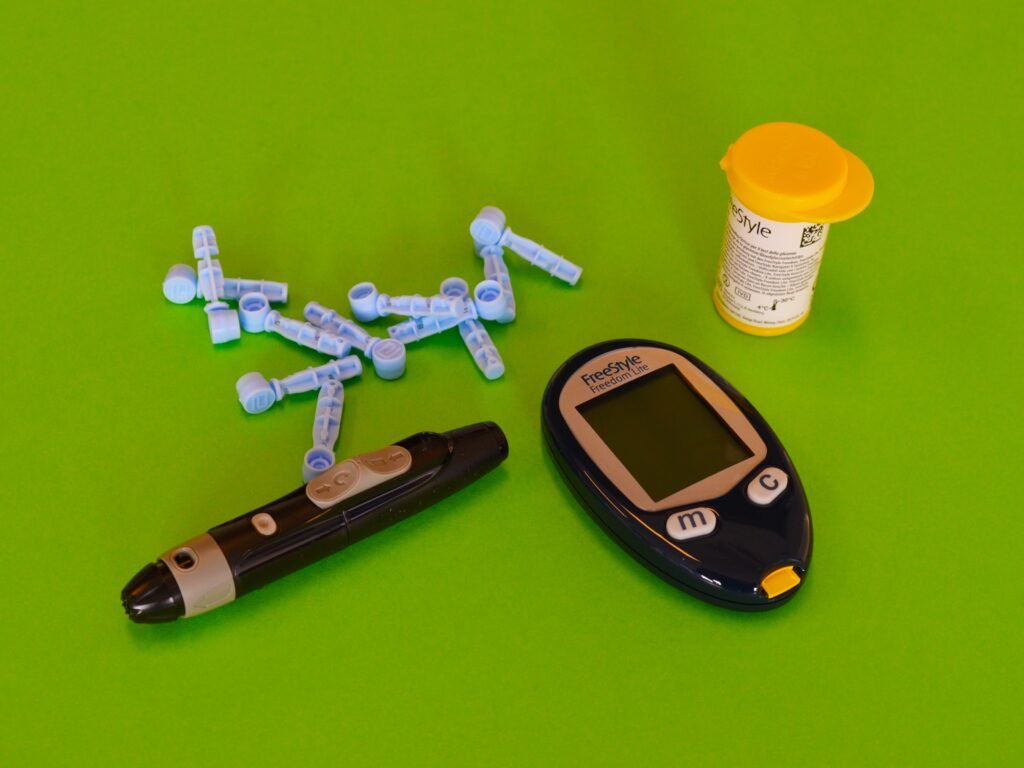Did you know that alternative medicine could potentially be used for managing diabetes? Many individuals are turning to alternative approaches to complement their conventional treatments, aiming to have more control over their health and well-being. In this article, we will explore various alternative therapies and techniques that have shown promise in helping individuals with diabetes manage their condition effectively. From herbal remedies to acupuncture and mindful meditation, discover how these alternative practices might be beneficial for you.

Overview
Understanding Diabetes
Diabetes is a chronic condition that affects millions of people worldwide. It occurs when the body is unable to properly regulate blood sugar levels, either due to inadequate production of insulin or the body’s inability to effectively use insulin. There are two main types of diabetes – type 1 and type 2. Type 1 diabetes is an autoimmune disease in which the body’s immune system mistakenly attacks and destroys the insulin-producing cells in the pancreas. Type 2 diabetes, on the other hand, is characterized by insulin resistance, where the body’s cells do not respond effectively to insulin.
The Role of Traditional Medicine in Managing Diabetes
Traditional medicine has been used for centuries to manage various health conditions, including diabetes. While conventional medicine plays a crucial role in the management of diabetes, alternative medicine approaches can also be considered in conjunction with conventional treatments. Alternative medicine focuses on a holistic approach to healthcare and aims to address the root causes of a disease rather than simply treating its symptoms. It encompasses various practices, such as herbal medicine, acupuncture, Ayurveda, and homeopathy, which can offer potential benefits in managing diabetes.
Types of Alternative Medicine
Herbal Medicine
Herbal medicine utilizes the healing properties of plants to promote health and well-being. Certain herbs have been found to have potential benefits for managing diabetes. For example, bitter melon, fenugreek, and cinnamon have been traditionally used to help control blood sugar levels. However, it’s important to note that while some herbs may show promise in managing diabetes, more research is needed to establish their efficacy and safety.
Acupuncture
Acupuncture is a traditional Chinese medicine practice that involves the insertion of thin needles into specific points on the body. This stimulates the flow of energy and helps restore balance. Some studies suggest that acupuncture may have a positive impact on blood sugar levels and insulin sensitivity in people with diabetes. However, further research is necessary to fully understand its effectiveness in diabetes management.
Ayurveda
Ayurveda is an ancient Indian system of medicine that focuses on achieving balance and harmony in the body, mind, and spirit. Ayurvedic treatments for diabetes often involve herbal remedies, dietary recommendations, and lifestyle modifications. Certain herbs, such as bitter gourd and Indian gooseberry, are commonly used in Ayurvedic medicine for their potential to regulate blood sugar levels. However, as with any alternative therapy, it is important to consult with a healthcare professional before incorporating Ayurveda into your diabetes management plan.
Homeopathy
Homeopathy is a system of alternative medicine based on the principle of “like cures like.” It involves using highly diluted substances to stimulate the body’s natural healing abilities. Some homeopathic remedies have been suggested for the management of diabetes, such as Syzygium jambolanum and Uranium nitricum. However, more research is needed to determine their effectiveness and safety in diabetes management.
Effectiveness of Alternative Medicine for Diabetes
Research Studies on Alternative Medicine
Numerous research studies have been conducted to explore the potential benefits of alternative medicine in managing diabetes. While some studies suggest positive effects, it’s important to approach these findings with caution. Many studies have small sample sizes or lack rigorous methodologies, making it difficult to draw definitive conclusions. Further research is needed to establish the safety and efficacy of alternative medicine approaches for diabetes management.
Patient Experiences and Testimonials
While scientific research is essential for evaluating the effectiveness of alternative medicine, anecdotal evidence in the form of patient experiences and testimonials also plays a role in shaping our understanding. Many individuals with diabetes report positive outcomes and improved quality of life when incorporating alternative therapies into their treatment plans. However, it’s crucial to remember that individual experiences may vary, and what works for one person may not work for another.
Benefits of Alternative Medicine for Diabetes
Control of Blood Sugar Levels
One potential benefit of alternative medicine approaches for diabetes management is better control of blood sugar levels. Certain herbs, acupuncture, and Ayurvedic treatments may help regulate blood glucose levels, potentially reducing the reliance on medications and insulin.
Reduced Dependency on Medications
By incorporating alternative medicine practices into a comprehensive treatment plan, some individuals may experience a reduced dependency on diabetes medications. This can have financial, physical, and psychological benefits, as the side effects and costs associated with long-term medication use may be diminished.
Promotes Overall Well-being
Alternative medicine often takes a holistic approach to healthcare by addressing not only the physical symptoms of diabetes but also considering the individual’s emotional, mental, and spiritual well-being. Practices like acupuncture and Ayurveda aim to restore balance and harmony within the body, promoting overall well-being and enhancing the quality of life for individuals with diabetes.

Risks and Limitations of Alternative Medicine for Diabetes
Unproven Claims and False Promises
One of the major risks associated with alternative medicine for diabetes is the prevalence of unproven claims and false promises. The lack of regulation and quality control in the alternative medicine industry makes it crucial to approach alternative therapies with caution. It’s important to consult with healthcare professionals and rely on evidence-based research when considering alternative approaches to diabetes management.
Potential Interactions with Conventional Treatments
Alternative medicine practices, such as herbal remedies and supplements, may interact with conventional diabetes medications. Some herbs can affect blood sugar levels, potentially leading to hypoglycemia or hyperglycemia when combined with certain medications. It is vital to inform healthcare professionals about all alternative therapies being used to ensure safe and effective management of diabetes.
Lack of Regulation and Quality Control
Unlike conventional medicine, alternative medicine practices are not subject to the same level of regulation and quality control. This means that the safety, purity, and efficacy of alternative therapies may vary greatly. It is important to research reputable practitioners and products, and to consult with healthcare professionals before incorporating alternative medicine into your diabetes management plan.
Integrating Alternative Medicine with Conventional Treatment
Consulting with Healthcare Professionals
Before considering alternative medicine approaches for diabetes management, it is crucial to consult with healthcare professionals. They can provide valuable guidance and ensure that any alternative therapies are safe and compatible with your existing treatment plan. Healthcare professionals can also help monitor your progress and make necessary adjustments to optimize your diabetes management.
Monitoring Blood Sugar Levels
When incorporating alternative medicine into diabetes management, it is important to continue monitoring blood sugar levels regularly. This allows you to track the impact of alternative therapies on your blood glucose levels and make informed decisions about your overall treatment plan.
Following a Comprehensive Treatment Plan
Alternative medicine should not be seen as a replacement for conventional diabetes treatment but rather as a complementary approach. It is important to follow a comprehensive treatment plan that includes regular medical check-ups, medication management, a healthy diet, regular exercise, and the incorporation of alternative therapies when appropriate.

Herbal Medicine for Diabetes
Popular Herbs for Diabetes Management
Certain herbs have shown potential benefits for managing diabetes. Some popular herbs include bitter melon, fenugreek, cinnamon, and ginseng. These herbs may have properties that help regulate blood sugar levels and improve insulin sensitivity. However, it is important to consult with healthcare professionals and carefully consider the dosage and administration of these herbs.
Potential Benefits and Side Effects
Herbal medicine for diabetes management may offer potential benefits such as improved blood glucose control, increased insulin sensitivity, and reduced inflammation. However, it is essential to be aware of potential side effects, interactions with medications, and individual sensitivities. Common side effects of herbal remedies may include gastrointestinal disturbances, allergic reactions, and interactions with other medications.
Dosage and Administration
The dosage and administration of herbal remedies for diabetes management can vary depending on the specific herb and individual needs. It is crucial to work with a knowledgeable healthcare professional or herbalist who can provide guidance on appropriate dosages, administration methods, and potential interactions with existing medications. Self-medication with herbal remedies should be avoided, as incorrect dosages can have adverse effects on blood sugar levels and overall health.
Acupuncture for Diabetes
Understanding Acupuncture
Acupuncture is a traditional Chinese medicine practice that involves the insertion of thin needles into specific points on the body. It is believed to stimulate the flow of energy and restore balance within the body. Acupuncture sessions are typically painless and can be administered by trained practitioners.
Effects on Blood Sugar Levels
Some studies have suggested that acupuncture may have positive effects on blood sugar levels in individuals with diabetes. It is hypothesized that acupuncture may help regulate insulin production, improve insulin sensitivity, and reduce inflammation. However, more research is needed to fully understand the mechanisms and effectiveness of acupuncture in diabetes management.
Frequency and Duration of Acupuncture Sessions
The frequency and duration of acupuncture sessions for diabetes management may vary depending on the individual’s needs and response to treatment. Some individuals may benefit from weekly sessions initially, followed by less frequent sessions as their condition improves. It is important to work with a qualified acupuncturist who can tailor the treatment plan to your specific requirements.

Ayurveda for Diabetes
Principles of Ayurvedic Medicine
Ayurveda is an ancient Indian system of medicine that focuses on achieving balance in the body, mind, and spirit. Ayurvedic treatments for diabetes often include a combination of herbal remedies, dietary recommendations, and lifestyle modifications. The underlying principle of Ayurveda is to identify and address the root cause of imbalances in the body, rather than simply treating symptoms.
Herbal Remedies and Dietary Recommendations
Ayurvedic medicine incorporates various herbal remedies and dietary recommendations to help manage diabetes. Herbs commonly used in Ayurvedic treatments for diabetes include bitter gourd, Indian gooseberry, and holy basil. Dietary recommendations may include consuming foods that help balance blood sugar levels, such as whole grains, vegetables, and lean proteins.
Ayurvedic Treatments for Diabetes
Ayurvedic treatments for diabetes may involve a combination of herbal remedies, dietary modifications, lifestyle changes, and specific practices tailored to the individual’s dosha or body constitution. These treatments aim to restore balance in the body, strengthen the digestive system, improve insulin sensitivity, and promote overall well-being. It is important to work with a qualified Ayurvedic practitioner who can create a personalized treatment plan based on your specific needs.
Homeopathy for Diabetes
Principles of Homeopathy
Homeopathy is a system of alternative medicine based on the principle of “like cures like.” It involves using highly diluted substances to stimulate the body’s natural healing abilities. The goal of homeopathy is to treat the individual as a whole rather than targeting specific symptoms.
Common Homeopathic Remedies for Diabetes
Homeopathic remedies for diabetes aim to address the underlying imbalances in the body and promote overall well-being. Common remedies used in homeopathic treatment for diabetes include Syzygium jambolanum, Uranium nitricum, and Insulinum. These remedies are chosen based on the individual’s specific symptoms, overall health, and response to treatment.
Individualized Treatment Approaches
Homeopathy focuses on individualized treatment approaches, taking into account the unique symptoms and characteristics of each person. As homeopathy is highly individualized, it is important to consult with a qualified homeopath who can prescribe remedies and monitor progress based on your specific needs. Self-medication with homeopathic remedies should be avoided, as incorrect remedies and dosages may have adverse effects.
Safety and Efficacy of Homeopathy for Diabetes
The safety and efficacy of homeopathy for diabetes management are still subjects of debate. While some individuals report positive outcomes, more research is needed to establish the scientific basis and effectiveness of homeopathy for diabetes management. It is important to consult with healthcare professionals and consider alternative therapies as adjuncts to conventional diabetes treatment.



